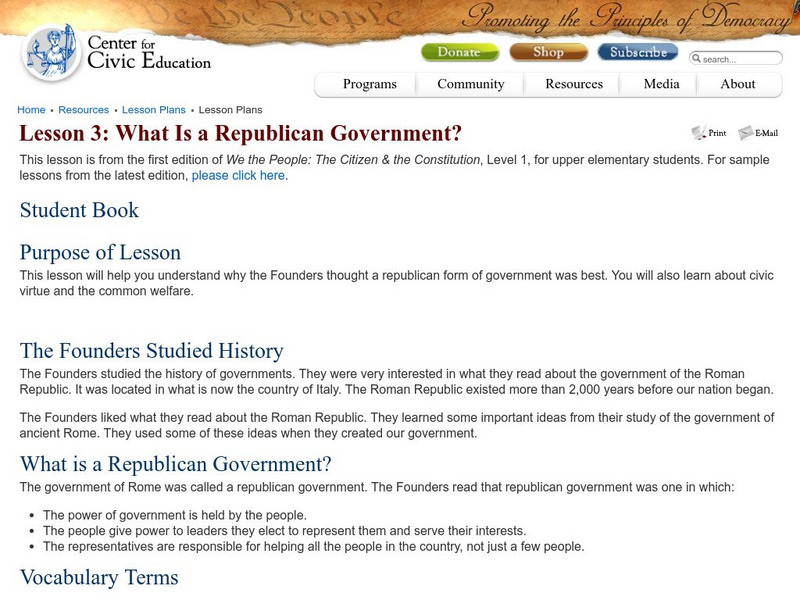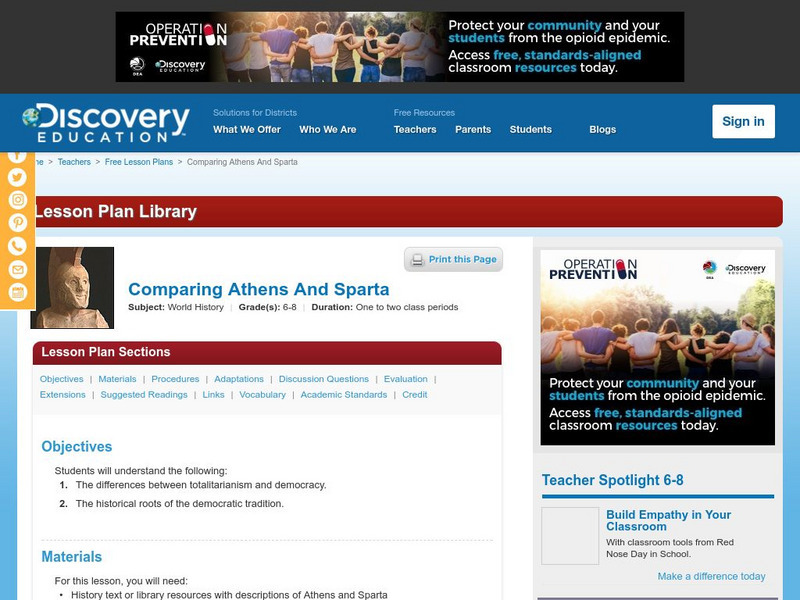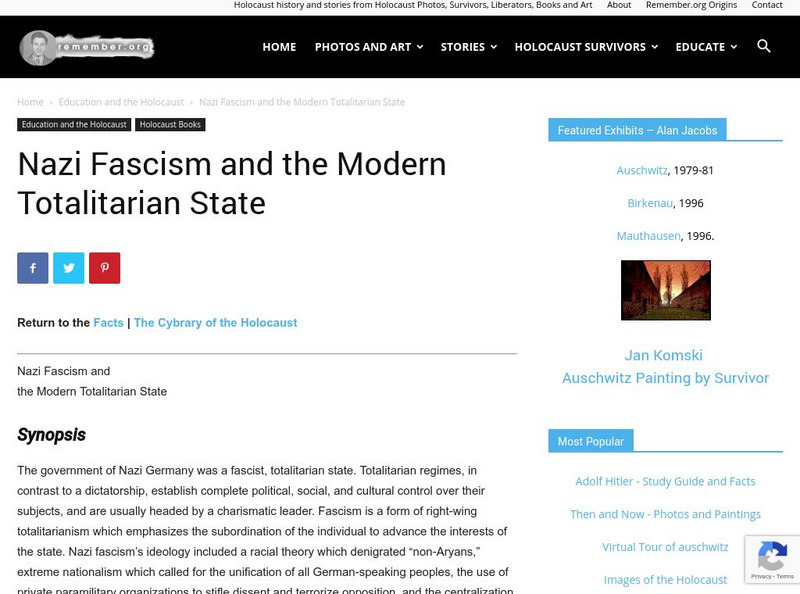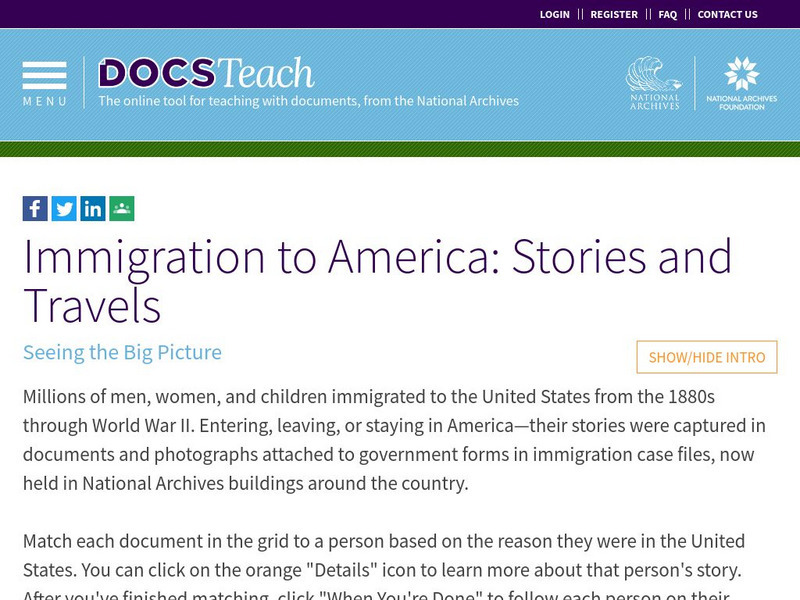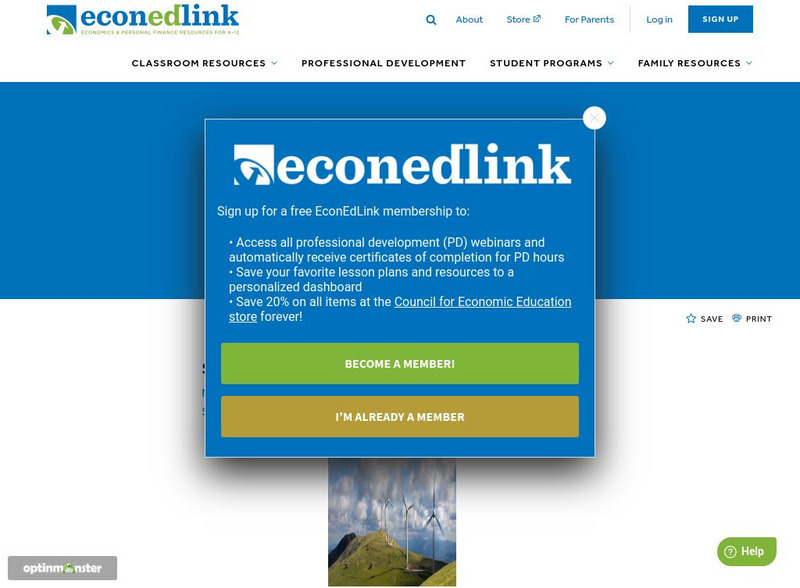Center For Civic Education
Center for Civic Education: What Is a Republican Government?
The founding fathers studied different forms of government throughout history to come up with the best form of government for our new nation. They decided a republic suited our nation the best. Find out the advantages of this type of...
Center For Civic Education
Center for Civic Education: What Is a Republican Government?
This instructional activity will help you understand why the Founders thought a republican form of government was best. Young scholars will also learn about civic virtue and the common welfare.
iCivics
I Civics: Who Rules?
Learn about the different forms of government that exist, including democracy, autocracy, oligarchy, and others. Compare and contrast these forms, and look at real-life examples in the world today.
Discovery Education
Discovery Education: Rome's Rise to Power: The Republic
A detailed lesson plan designed to teach students about the republican form of government established by the Romans in their early history and also how it relates to American government today.
Discovery Education
Discovery Education: Comparing Athens and Sparta
Introduce the ideas of limited and unlimited government with a lesson on the government styles in Ancient Greece. Students will compare and contrast Athens and Sparta to understand the two very different governments that each employed....
Center For Civic Education
Center for Civic Education: The Federal System Created by the Constitution [Pdf]
In this lesson plan, young scholars will learn how the Constitution established a new way to organize a government, called the federal system. When finished this lesson plan, students should be able to explain what a federal system is...
iCivics
I Civics: Foundation Basics
For this lesson, young scholars are introduced to the characteristics of power, authority, legitimacy, and sovereignty, consider how governments establish and maintain them, and analyze government forms to determine if and how each...
iCivics
I Civics: Foundation Basics
In this lesson, students are introduced to the concepts of authority, legitimacy, and sovereignty and consider how governments establish and maintain these foundational characteristics.
Other
Remember.org: Nazi Fascism and the Modern Totalitarian State
A lesson plan which includes a reading that distinguishes between the various forms of totalitarian dictatorships in reference to fascism. States the instructional objectives and chapter content covering characteristics of...
National Humanities Center
National Humanities Center: America in Class: Thoreau's Critique of Democracy in "Civil Disobedience"
National Humanities Center lesson explores the criticisms Thoreau makes about a representative democracy form of government. Lesson includes interactive assignments, teacher notes, strategies for Close reading, follow-up and vocabulary.
iCivics
I Civics: Clapper v. Amnesty International (2013)
This mini-lesson covers the basics of the Supreme Court's decision that determined the government's ability to conduct electronic surveillance of its citizens. Students learn about the First Amendment right to free speech, the Fourth...
Alabama Learning Exchange
Alex: News Flash: The End of the Cold War
This lesson is an inquiry into events that occurred during the Cold War era. It is a technology-based project on one event that occurred during the Cold War(1945-1991). The Cold War describes the tense and hostile relationship between...
US National Archives
Docsteach: Immigration to America: Stories and Travels
This activity asks students to match documents to individuals based on the reasons these people came to and were living in the United States. The photographs and documents are attached to government forms in some of the millions of...
Council for Economic Education
Econ Ed Link: Blowing in the Wind
Wind energy is becoming a viable alternative to more traditional forms of energy generation. In this lesson plan, students will determine the feasibility of wind generation in different areas of the United States. Finally, students will...
Council for Economic Education
Econ Ed Link: Be an Energy Saver
This lesson focuses on the scarce and non-renewable nature of fossil fuels in order to stimulate student thinking about energy conservation. It emphasizes the fact that saving energy can be good for the wallet as well as the earth's...
iCivics
I Civics: Rule by One
Why has monarchy been one of the most common forms of government throughout history? In this lesson, learners explore the advantages and disadvantages of monarchial rule and consider how rule by one came to reign.
iCivics
I Civics: Texas v. Johnson (1989)
This mini-lesson covers the basics of the Supreme Court's decision that burning the American flag is a form of political speech protected by the First Amendment. Students learn about the First Amendment freedom of speech and the...
iCivics
I Civics: Interest Groups
students will learn how people form interest groups, and how they influence the government. This lesson uses the battle over school lunch ingredients to illustrate how interest groups and lobbying affect public policy.
Ohio State University
Osu History Teaching Institute: Articles of Confederation vs. the u.s. Constitution
Fourth graders will be introduced to the primary documents of the Articles of Confederation and the US Constitution. They will figure out the weaknesses of the Articles of Confederation and compare them to the US Constitution. Students...
Other popular searches
- Compare Forms of Government
- World Forms of Government
- Ancient Forms of Government
- Four Forms of Government
- Forms of Government Rating=3
- Many Forms of Government
- Forms of Government 2nd
- Forms Government Lesson Plans
- Different Forms of Government
- Forms of Government Intervent
- Greek Forms of Government
- Forms of Government Inter Vent

